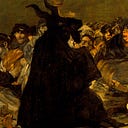I dream as a Neo-Egyptian, speed through cities with night’s blazing shapes and colors, forms I never have to read to understand. The golden arches burning McDonald’s onto every cornea, that green-and-white mermaid telling me where the caffeine is, the yellow demi-asterisk in a sea of blue giving me assurance that Walmart is nearby and waiting. Increasing levels of the human visual language is corporate. Where once the Ox was Luke and Mark the Lion, they are now Merril Lynch and Fidelity. The co-opting of these ancient, vital symbols is not wrong in itself, however in a world where one sees representations of animals as corporate avatars far more often than one sees the actual animal doing animal things, I start to wonder at the effects this has on the human race.
Consider the following:
Every single non-pronoun noun in that thought is a corporate logo or mascot, a hieroglyphic, yet to any average American there is a full message. Each logo contains all the information of the brand name (and relevant brand connotations) being referenced, with the extra benefit that one need not read to extract information from image. The image is ubiquitous as the brand, an important element of the brand that bypasses any rational or thought-based comprehension to hit at a network of associations pre-implanted through written and/or sensual stimulus.
With a logo I can summon up a fleet of cars visually unrelated, with a logo I can summon up a store which implies a whole lifestyle. With a single logo I can drag into consciousness a host of thought on national infrastructure and law, how insurance and finance are set up, who has access to what bands of society based on fortune or misfortune, etc. With golden arches I can imply health issues and America and comfort and food and wifi and cheapness and a specific standard and cleanliness. With a
I can imply a social class and a purchasing power and an individual value and lifestyle and the semblance of style even without aesthetic value. There is a magic to the modern set of corporate hieroglyphics.
Beyond the hieroglyphic lexicon, corporate titles and words invade our broader cultural consciousness, replacing words we’ve long had for specifics, which both limits and empowers. Easier and older examples include Kleenex and Band-Aid. People seldom ask for facial tissue, and seldom ask for adhesive bandages for owies . We ask for Kleenex or Band-Aids. While Kleenex is a specific brand of facial tissue, it implies the whole genre of creation due to its ubiquity and excellent advertising. While any adhesive bandage will usually do, a Band-Aid implies a size and shape and type of bandage, one for smaller or moderate wounds which require no great swath of gauze and tape.
This concept continues well on into the modern era. We seldom research. We Google. Googling is a specific kind of research, one that often barely qualifies as research. It involves searching a specific database for information which may or may not have any factual basis in a specific way: poking around the Google database with the Google algorithm for different Google results. Because of the primacy of Google in the modern life, most people, English-speaking or not, will understand what you mean.
We snap one another (Snapchat). We Reddit away our days and Tweet our thoughts. We Facebook one another, and within that context “like” and “friend” take on entirely new meanings. These corporate platforms for socialization have overtaken whole dimensions of the human experience, to the point where they co-opt and maybe subsume preexisting terms. These terms add to the human experience by lending relevance to the novel platforms we use to communicate with one another, acquire new popular information, and interpret and interact with reality.
Each neologism adds something to the human lexicon while crowding the space of preexisting terms and modulating other terms in their conceptual cloud (ex: facebook — “friend”, block, like; reddit — up/down-vote; ebook; iphone; etc.). They add and take away from our consciousness.
This is an effect we must be aware of as corporations actively coopt the language to their own advantage. There is a set amount of real estate in the linguistic/national/cultural consciousness. As more of our media/methods of message reproduction are owned and mediated and filtered and observed, impinged-upon by advertisement and lent to by the hieroglyphs of specific communication media (ex: emojis, .gifs and .jpgs [how prescient the image board!], bitmojis, etc.), the more we adapt our consciousness to self-expression in these novel forms of abstraction and mutate the global dialectic in perhaps proprietary ways.
What does it mean to own and commodify the stuff of thought?
- 04.28.2019
